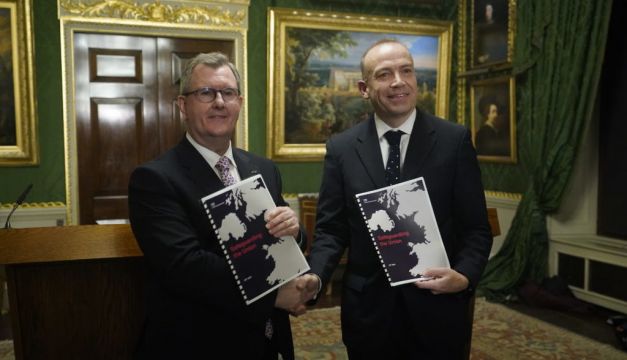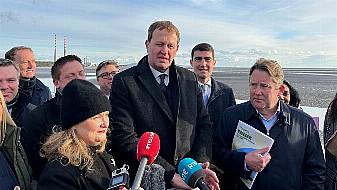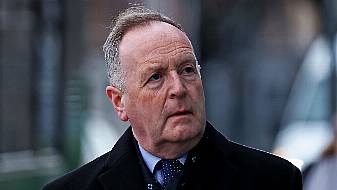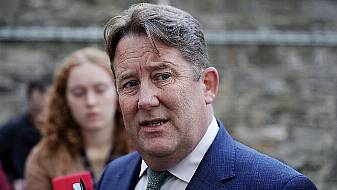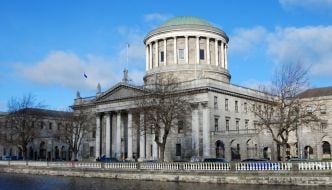A British government package to restore powersharing at Stormont has delivered “fundamental change” to UK-EU arrangements on post-Brexit trade, the leader of the DUP has insisted.
Jeffrey Donaldson claimed his party had negotiated “clear” alterations to the Windsor Framework by ending routine checks on goods moving from Britain to final destinations in Northern Ireland.
Major changes to the UK/EU legal framework would require the approval of Brussels.
Downing Street, however, has insisted the measures unveiled on Wednesday do not require specific EU sign-off, characterising them instead as “operational” changes to the framework, without altering the “fundamentals” of the bilateral deal.
The British prime minister’s official spokesman said: “I won’t speak for the EU but this is a negotiation between the UK and the DUP. This is not about altering the fundamentals of the Windsor Framework.”
He added: “We do believe that the changes that we are implementing are significant.”
British foreign secretary David Cameron and Northern Ireland Secretary Chris Heaton-Harris both spoke with EU Commission Vice-President Maros Sefcovic on Wednesday to outline the proposals.
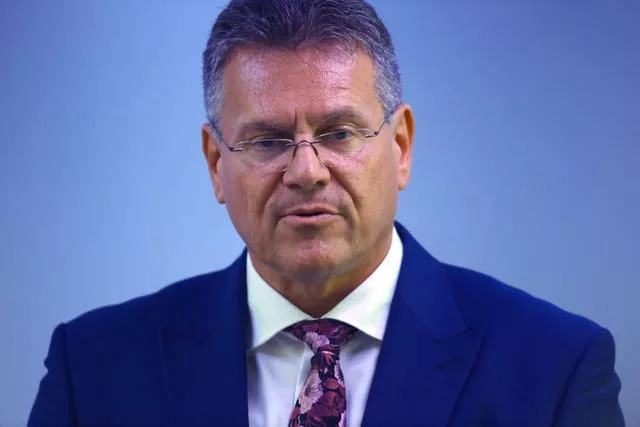
In a statement, the EU Commission said it would “carefully analyse” the measures.
“The executive vice-president and the Foreign Secretary both agreed on the high importance of seeing the Northern Ireland Executive restored and delivering for the people of Northern Ireland,” the commission added.
Tánaiste Micheál Martin, who met political leaders in Belfast on Wednesday, said he did not expect Brussels would have any difficulties with what has been tabled.
On Tuesday, prior to the command paper’s publication, the UK and EU did announce a joint move on trade tariff quotas that will increase the ability of Northern Ireland traders to import internationally-sourced agri-food goods via UK free trade deals with other countries.
Wednesday’s paper commits to replacing the Windsor Framework’s green lane process at Northern Ireland ports, which requires percentages of goods to be checked as they arrive from Great Britain, with a “UK internal market system” that will govern the movement of goods that remain within the United Kingdom.
Checks would still be carried out but on a risk-based/intelligence-led model to combat illegality and disease, rather than routine stops of disembarking lorries.
Mr Donaldson has hailed the move as a key concession that will effectively scrap the contentious so-called Irish Sea border for goods destined to remain within the UK.

Speaking at a joint press conference at Hillsborough Castle with Northern Ireland Secretary Chris Heaton Harris, the DUP leader said: “I have absolutely no doubt any reasonable person reading this lengthy document, there is a lot of substance in this document that points to change, and I believe that is what we have delivered.
“So, one of my core objectives was to ensure that where goods are moving from Great Britain to Northern Ireland and staying within the United Kingdom, there would be no checks on those goods, save whether there’s a suspicion of smuggling or criminality.
“The Windsor Framework gave us a green lane, which involved the continuation of some checks and some declarations. That has gone and, by any measure, that represents a fundamental change to the way that goods coming from Great Britain to Northern Ireland are dealt with.”
Mr Heaton-Harris said the package did not involve any “weird dealings” with Brussels and everything in the package had been delivered in good faith.
He added: “There’s a whole chapter in here [the command paper], chapter four, which will take you through the further changes and their impacts on the Windsor Framework in no uncertain terms, and the government is committed to all of that chapter four.”
The Conservative MP said the package represented the “right deal” for Northern Ireland and the Union.
Mr Heaton-Harris said the British government would deliver quickly on the commitments made, with two pieces of legislation set to be fast-tracked through UK Parliament on Thursday.

The Stormont Assembly could sit again as soon as Saturday.
“This is the right deal for Northern Ireland and the right deal for the Union,” said Mr Heaton-Harris.
“It strengthens and further protects the UK internal market and the union, both now and in the long term.”
Mr Donaldson added: “Today’s agreement, I believe, is a positive and decisive step forward for Northern Ireland.”
The measure to reduce checks is part of a wide-ranging deal agreed between the DUP and the Government that is set to bring about the restoration of devolved government in Northern Ireland after a two-year hiatus.
Prime minister Rishi Sunak said reviving powersharing in Northern Ireland offered the prospect of a “brighter future”.
The DUP has agreed to drop its two-year blockade of Stormont in exchange for the British government measures aimed at addressing its concerns about post-Brexit trading arrangements that created economic barriers between Northern Ireland and Britain.
While Mr Donaldson has secured the backing of a majority of senior party colleagues to accept the deal, there are those within the DUP who remain deeply sceptical of the proposed agreement to restore powersharing.
East Antrim MP Sammy Wilson demonstrated that on Wednesday, voicing his concerns and heavily criticising the British government as the package was debated in parliament.
He said the continued application of EU law in Northern Ireland was the result of “spineless, weak-kneed, Brexit-betraying government, refusing to take on the EU and its interference in Northern Ireland”.
Challenged by reporters on Mr Wilson’s remarks, Mr Donaldson insisted his party was not split.
He said when his 130-strong party executive deliberated on the package in a five-hour meeting on Monday night the majority in favour was “very wide” and “absolutely decisive”.
Mr Donaldson also hit out at critics outside his party, namechecking TUV leader Jim Allister to ask directly what progress he had made over the last two years.

He suggested Mr Allister and other vocal opponents of the deal had delivered a “big blank sheet of nothing” when it came to removing the sea border.
Under the deal, the post-Brexit red lane for transporting goods from GB to NI and on into the EU single market will remain, but the command paper offers measures aimed at reducing the volume of trade required to use that red-tape heavy route, with a prediction that 80 per cent of goods will now move free of routine checks through the internal market system.
The package includes “future-proof” commitments that rule out future EU/UK protocols or agreements that would see Northern Ireland treated differently to the rest of the UK.
As well as moves to cut Brexit bureaucracy on Irish Sea trade, the command paper includes a series of measures aimed at providing assurances around Northern Ireland’s constitutional position.
The British government will also provide the legislative underpinning to give the Stormont Assembly a democratic oversight function in respect of new EU laws set to be introduced in the region.
The oversight procedures already outlined in the Windsor Framework include the so-called Stormont brake mechanism that enables 30 or more MLAs to flag a concern about a new EU law.
The British government is obliged to assess whether those concerns meet a threshold that could then result in the UK vetoing the application of the law in the region.
The command paper also includes commitments to ensure Northern Ireland goods will always be able to be sold in the British market regardless of any divergence in EU and UK standards.
In respect of further UK divergence from EU standards, there is also a legal requirement that new Westminster legislation is assessed as to whether it “impacts on trade between Northern Ireland and Great Britain”.
If it does, there will be a statutory duty for the relevant minister to make a statement “considering any impacts on the operation of Northern Ireland’s place in the UK’s internal market”.
A requirement that saw certain goods sold in Northern Ireland to display a label stating “not for sale in the EU” will now to extend to cover the whole UK.
The package also includes the creation of two new bodies aimed at strengthening trade links between Britain and Northern Ireland – the East West Council and Intertrade UK.
Other measures in the deal include a drive to press ahead with the stalled devolution of corporation tax powers to Northern Ireland and a commitment from the UK government to hold cabinet meetings periodically in the region.
The British government will also enter into exploratory talks with the US on allowing pre-clearance checks on customs and immigration to take place at Belfast International Airport on passengers flying directly to the US.
There are no direct flights at the moment but the move is being seen as a potential incentive for airlines to consider operating routes from Northern Ireland to the US.
The return of Stormont will see the UK government release a £3.3 billion (€3.8 billion) package to support under-pressure public services in Northern Ireland.
The financial package, announced before Christmas, includes money to settle the demands of striking public sector workers in the region this year.
